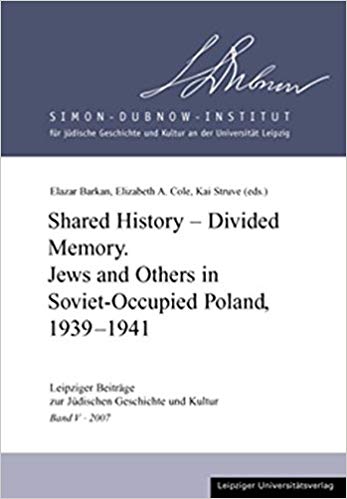Censored Scholars Bogdan Musial and Krzysztof Jasiewicz Barkan

Shared History, Divided Memory by Elazar Barkan (ed.) 2008
Censorship of Independent-Thinking Scholars: Now it is Bogdan Musial and Krzysztof Jasiewicz
The most important content of this book inadvertently highlights the stifling of academic freedom in academia. The censure (or worse) of historians who deviate, from the party line, on Polish-Jewish relations, exerts a dangerous chilling effect on all other independent-thinking scholars.
HISTORIAN BOGDAN MUSIAL APPARENTLY STEPS OUT OF LINE
Regardless of what exactly Polish scholar Bogdan Musial had meant, the abject hostility, towards any hint of thinking that deviates from the standard Judeocentric narrative, is evident from the following statements, of Kai Struve, about Musial and his position, “Musial stresses the support of the Soviet occupation regime among the Jews, and the comparatively better situation the Jews enjoyed when contrasted with other nationalities. Here some readers sensed anti-Semitic patterns of argumentation under the surface of Musial’s assertions, since this would suggest the Jews themselves bore some responsibility for the pogroms due to their own behavior.” (p. 62).
A scholar has committed a thoughtcrime potentially thinking that Jews could do wrong! It always has to be everybody else’s fault.
PROFESSOR KRZYSZTOF JASIEWICZ ESTEEMED IN THIS BOOK
At the time this book was published (2007), Krzysztof Jasiewicz tended to downplay the collaboration of the local Jews with the Soviet invaders of eastern Poland in 1939. For this reason, he was hailed as an authoritative and pathbreaking scholar by neo-Stalinist Joanna B. Michlic in her Polonophobic screed (p. 76, 81). He was also treated favorably by Rafal Wnuk (p. 151) and Alexander Brakel (p. 242), as well as by Elazar Barkan, Elizabeth A. Cole, and Kai Struve. (pp. 29-30).
PROFESSOR KRZYSZTOF JASIEWICZ SUBSEQUENTLY PUNISHED FOR SAYING UNFLATTERING FACTS ABOUT JEWS
And then–years after this book had come out in print—Jasiewicz no longer toed the line, and he suddenly found himself a pariah. How so?
Scholar Krzysztof Jasiewicz was fired from a leadership position that he held at the Polish Academy of Sciences (2013), as a result of Jewish pressure, for now saying things not to their liking. Jasiewicz had suggested that Jews had played a major role in their own extermination by the Nazi Germans. What he said was unremarkable. German Jew Hannah Arendt had pointed out essentially the same thing decades earlier!
Regardless of what Jasiewicz exactly said, and whether or not one agrees with everything he said, one must support his right to free speech and academic freedom. Quite a few Jewish academics had made vile statements about Poles and about Christianity, and yet nobody calls for their dismissal. Away with the double standard!
—
Some scholarly facts from this book:
GRODNO 1939: A POGROM OR A JEWISH ANTI-POLISH, PRO-SOVIET INSURRECTION?
Political scientist Marek Wierzbicki comments, “Even some historians who accuse the Grodno authorities of organizing a pogrom of innocent Jews admit that armed groups of Jews and Belarussians attacked the city jail, thus beginning the fighting with the local police and the Polish army units supported by some civilians. The fact that there was still a city jail confirms that the legal authorities still existed then, so the attack was undoubtedly a move directed against the legal authority, which elicited a brutal but effective revenge.” (p. 143).
JEWISH PROFITEERING, AND EXPLOITATION OF THE LOCALS, SUPPORTED BY FACT
Jewish Belarussian historian Evgenii S. Rozenblat quotes a Soviet document on the conduct of Jewish refugees at Slonim. He writes, “‘In the majority of recorded cases, when refugees leave town, they hang about on the roads the entire day, catch peasants taking their products—butter, eggs, fruit, etc.—to market in town, buy up [the products] at a more reasonable price, and then carry them off to market and sell them at prices that are 2-3 times more expensive. As a consequence, products at the market have risen in price. For example, eggs from 3 rub. 50 kop./10 to 8-9 rub., meat from 6 rub. To 10-12 rub,/kg, etc.” (p. 217).
As an attempted exculpation for this conduct, Evgenii Rozenblat points out that these Jews were refugees that were facing severe privations. But weren’t the Polish and Belarussian peasants also going through hard times? Is this another double standard?
To see a series of truncated reviews in a Category click on that Category:
- All reviews
- Anti-Christian Tendencies
- Anti-Polish Trends
- Censorship on Poles and Jews
- Communization of Poland
- Cultural Marxism
- German Guilt Dilution
- Holocaust Industry
- Interwar Polish-Jewish Relations
- Jewish Collaboration
- Jewish Economic Dominance
- Jews Antagonize Poland
- Jews Not Faultless
- Jews' Holocaust Dominates
- Jews' Holocaust Non-Special
- Nazi Crimes and Communist Crimes Were Equal
- Opinion-Forming Anti-Polonism
- Pogrom Mongering
- Poland in World War II
- Polish Jew-Rescue Ingratitude
- Polish Nationalism
- Polish Non-Complicity
- Polish-Ukrainian Relations
- Polokaust
- Premodern Poland
- Recent Polish-Jewish Relations
- The Decadent West
- The Jew as Other
- Understanding Nazi Germany
- Why Jews a "Problem"
- Zydokomuna